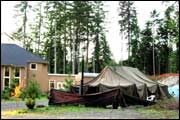Churches offer shelter from the storm
Working with other faith communities, Unitarian Universalist congregations are providing shelter to the homeless.
“We don’t care why they’re here,” said Mary Beth Guyther, chair of the shelter project at the Unitarian Universalist Fellowship of Huntington, New York. “We’re here to keep them out of the cold.”
The fellowship joined the Huntington Interfaith Homeless Initiative after hearing that families were sleeping in the woods during the harsh winter of 2003-04. Five churches in the Long Island community take turns hosting homeless people one or two nights a week, and 28 churches help with transportation, cooking, and staffing. About a third of the UU congregation’s 300 members and many of its children serve as volunteers.
After buying sleeping bags and other reusable supplies, the church has incurred minimal cost. Volunteers donate most of the food and do most of the laundry. A local laundry service cleans the sleeping bags as a donation.
One night when the UU church was hosting the shelter, and local synagogue volunteers were helping, a guest asked one of the fellowship’s youth to read the Lord’s Prayer in Spanish. “It was very touching,” Guyther said. “The synagogue was staffing at our UU fellowship and we’re reading the Lord’s Prayer--it symbolized the interfaith aspect of this program.”
Two years ago the UU Church of Cheyenne, Wyoming, helped found the Cheyenne Interfaith Hospitality Network to shelter homeless people. The experience has been a good one, the Rev. Makanah Morriss said, and has helped connect the congregation with religious people of differing theological and spiritual perspectives. This past year the network went on hiatus due to lack of funds, but the group now has a new director and is up and running again.
Since 2002 the Jefferson Unitarian Church in Golden, Colorado, has been offering shelter, meals, friendship, and encouragement to families who are temporarily homeless, as part of the Interfaith Hospitality Network of Greater Denver. The church provides overnight lodging and meals for up to 14 guests for one week about every three months.
The project requires 70 to 80 volunteers during the host week to help with meals, laundry, entertainment, and transportation--a big undertaking for her congregation, said Martha Sider, coleader of the shelter. Many of the church’s guests work but don’t earn enough to get by. Getting to know these families more personally, Sider said, reminds the congregation that we’re not that different, and we’re in this together.
On August 19, a traveling homeless encampment called Tent City 4 (TC4) moved to the Woodinville Unitarian Universalist Church in Washington for a three-month stint. The encampment takes up less than 5,000 square feet in the church parking lot and is not visible from the street, the Rev. Alex Holt said. The church provides electrical power, water, food, and transportation, and TC4 organizers provide portable showers, toilets, and heaters. Tent City houses up to 60 women and men, many of whom have minimum-wage jobs; no children are allowed. The average stay is about two months.
Woodinville member and activist Jim Kimbrough encouraged the church to welcome TC4, and the congregation voted overwhelmingly in favor last February. “We were the first church that gave them an open invitation,” Holt said.
All of the churches work to ensure the safety of everyone involved. Huntington’s program screens for drugs, and the self-enforced Tent City disallows drugs, alcohol, and aggressive behavior. “If they break the rules, they’re out,” Holt said.
The congregations also seek to educate the community about homelessness and their shelter projects. Holt’s congregation faced a small but vocal opposition. “It’s a complex PR situation,” he said. “There is a certain degree, as you might imagine, of knee-jerk, not-in-my-backyard reaction.” Community anxiety is much less than a year ago, he added, and despite some initial anxiety about space and security, the congregation has been pleased. “It has actually attracted a number of people to the church who’ve heard that we’re doing this,” he said.








